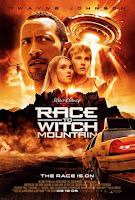 If this is the brave new world to which 3D is transporting us, stop the merry-go-'round. I want to get off.
If this is the brave new world to which 3D is transporting us, stop the merry-go-'round. I want to get off.Monsters vs. Aliens, one of the 2009 big movies designed to highlight where 3D could transport audiences, is an example of technology run amok. With a slight, light screenplay that required five credited writers, the film tells an unimaginative story about an alien invasion of Earth that is foiled by "monsters." Of course, they're not really monsters. They're just misunderstood. But since they're in the 3D, we're too busy watching whizzing comet fragments fly out of the screen to care about things like plot or character development. It's a good thing, too, because anyone on the lookout for those elements may be a little disappointed. This should not be confused with the vastly superior Monsters Inc.
I'm sure the average five year-old will be enchanted. But the average five year old watches Teletubbies and Sponge Bob Squarepants. The problem with Monsters vs. Aliens is that all those writers didn't think much about potential audience members on the hairy side of puberty. Oh, there are some clever one-liners and the occasional sight gag, but there are too few of those moments to keep the adults from becoming restless. Despite a multitude of opportunities to satirize '50s B-grade science fiction and monster movies, there's only a little of that (veiled references to Attack of the 50 Foot Woman, The Blob, The Creature from the Black Lagoon, and The Fly). Too much would, after all, confuse the five year olds. And why put thought into a script when you can let the computers send something else whizzing at the audience?
Monsters vs. Aliens suffers from the common 3D problems: dim lighting, poor focus in fast-paced action sequences, and too many distractions for the movie to grab the viewer. With Coraline, it looked like things might be going in the right direction, but Monsters vs. Aliens is a major step backward. Last year, the "K" of "Dreamworks SKG" did a dog-and-pony show proselytizing skeptics to join the True Faith of 3D. It's too bad this is all he has to show for it. Had he come armed with something less obviously recycled, his words might not now ring hollow.
Susan Murphy (voice of Reese Witherspoon) is getting ready for her wedding day when a meteor strike complicates her perfect small town domestic existence. A substance contained in the meteor causes her to glow green then grow until she's big enough to be called Ginormica. The government arrives before she can say "I do" and incarcerates her in a prison for monsters, where she makes the acquaintances of other misfits: the blobby B.O.B. (Seth Rogan), the aptly named Dr. Cockroach (Hugh Laurie), and The Missing Link (Will Arnett). Things aren't looking too good for Susan until Gallaxhar (Rainn Wilson) comes calling. His goal has something to do with wiping out humanity and repopulating Earth with his own kind - typical megalomaniac space alien stuff. President Hathaway (Stephen Colbert) decides to let loose the monsters in the hope that they and the aliens will eliminate each other. Meanwhile, all Susan really wants is to be respected for who she is. Sniff sniff.
There was a time when Dreamworks looked like it might be poised to challenge Disney/Pixar for the digital animation throne. That day has long since passed and, as Pixar strives to improve with every new feature, Dreamworks offers us this. Visually, the film is okay, but nothing special, and certainly nothing on par with WALL-E. The idea seems to be that the presence of 3D eliminates the need to invest effort into striving for the highest quality animation. And this is the real danger of 3D - that the "wow" factor becomes so important that other elements are neglected.
This is not a movie. It's an amusement park ride. It's a chance for kids to "ooh" and "ahh" while parents catch a nap. Sure, the film is sweet and harmless but, take away the 3D, and all you're left with is a generic kids' movie, not unlike Madagascar and its sequel (both of which also came from Dreamworks). Monsters vs. Aliens is a gallery of missed opportunities. There are a couple of lame King Kong references, a nod to Star Trek, and a musical echo of Close Encounters, but that's about it. Yet, despite the presence of a War Room and a Buck Turgidson-type (named General W.R. Monger, and voiced by Jack Bauer), there's not a hint of Dr. Strangelove to be found. It's almost as if someone put the setup in place then forgot the punch line.
The 3D is distracting but, in this case, that's a good thing, because it livens things up. But it also indicates that had Monsters vs. Aliens been a good movie, it would have worked better in 2D. Katzenberg said he wanted to make 3D an integral part of the movie-going experience, but with Monsters vs. Aliens, he has provided one of the most gimmicky 3D movies since the resurgence of the format.















